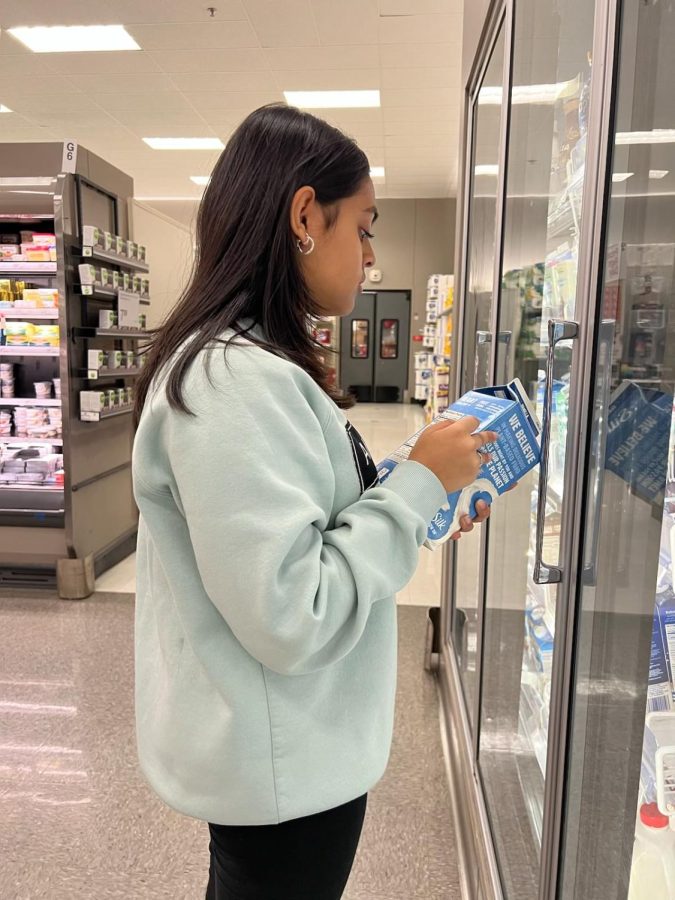Taking on allergy anxiety
The impact of allergies on my mental health
Photo by Sashrika Shyam
Sashrika Shyam, junior, checking the ingredients of non-dairy milk. This has become a common practice every time I am at a grocery store.
About 5.6 million teenagers suffer from food allergies in the United States alone, myself included. This means that there are possibly 5.6 million different experiences with food allergies. Each situation is different, each reaction is different, and the impacts of food allergies on mental health is different for everyone as well.
Growing up with food allergies to dairy, eggs, some meat, and seafood, I do not know anything else. Allergies are my “normal”, but that does not mean I have become immune to the reactions. When I eat something I am allergic to, I have a severe reaction, involving throwing up nearly everything I have eaten. Now, everytime I feel sick, I get very anxious that I will have an allergic reaction.
According to an October Bear Facts Survey of 252 students, 76% feel that people with food allergies suffer from anxiety. The constant practice of checking ingredients and nutrition information is very anxiety inducing for me, as well as the worry that comes with eating new food.
Along with the anxiety of having a reaction, I also have not been able to eat foods that I have previously reacted to. I would not exactly call this PTSD, as it is not as severe. But for example, I cannot stand the smell or taste of a veggie burger I had a reaction to.
According to an article published in the National Library of Medicine, there is a term for this type of association: conditioned taste aversion. This is defined as “a learned association between the taste of a particular food and illness such that the food is considered to be the cause of the illness.”
I think that for me, my biggest struggle is anxiety. I can tell every time I eat dairy, because my tongue will feel weird and “itchy”. After I drink coffee from any shop, I wait for that feeling. It is a constant fear. I think “Is it just random or is it an allergic reaction?”, “If it is an allergic reaction, what should I do?”, or “I ate it at this time, so if it was something I’m allergic to I will react two hours later.”
Because the reaction comes like clockwork, it increases the anxiety for not only me, but for my parents. I see what they go through every time I get food from a new restaurant, and even though I know that it is not my fault, I still feel terrible for making them go through that.
My allergies also impact my social life. This past February, I had the once in a lifetime opportunity to go to New York City with the choir program. I was so excited, but there was a looming fear in my head. I was going to be gone for five days. Five full days of my parents unable to make sure the food I ate was safe. Five days of worry and stress that other students did not have. 12+ meals I had to plan before I left.
Needless to say, the trip went smoothly, all the teachers and chaperones were amazing with my allergies. However, that did not alleviate the stress and worry. My parents were constantly checking in on me, analyzing pictures of the food I sent them, asking for pictures of ingredients, and finding many restaurant options by calling them from home and figuring out what I could eat. They were in constant communication with my chaperone, and she was so helpful in making sure I always had something to eat.
I truly am so grateful for everything my parents did to make this New York trip possible, but I would be lying if I said that allergies did not impact my social life on that trip. It hurt not being able to eat with my friends who went to a restaurant I could not eat at, and it hurt that it was out of my control. I look back on the trip with fond memories, but I will not be able to forget how I felt at times, that is just something that comes with my situation.
In addition to my experience on the New York trip, my food allergies often impact my social life even at home. Whenever I went to birthday parties as a kid, I had to bring my own food. I felt awkward and left out everytime I had food I brought from home while everyone else was eating food from the party. I did not know how to answer the many questions like “So you can’t eat pizza?” or “How can you live without ice cream?” and that led me to be embarrassed of my situation.
I have learned how to deal with these comments effectively as I have grown up. I am now able to educate people about how many options I have and spread awareness about people with allergies. I have also been lucky in the sense that there have been so many alternatives and restaurants that offer allergen free options. I can get coffee from Jazzman’s, pizza from Mod Pizza, and I get food from Noodles and Company at least twice a week. My mom has even told me she would never have imagined so many options for me when I was a kid.
The feeling of exclusion has been reduced so much, but that does not mean it’s completely gone. It comes in many different forms, such as jokes that some people make. I joke about my allergies a lot, I feel like because I live through them I am able to see the humor. I do not mind it when my close friends joke about it either. However, when a joke comes from someone I barely know, I do not really see the humor.
Every situation is different, the people closest to me respect my situation and only joke at times when they know it is ok and I will not get hurt. Other people do not know me well enough to know when I am not going to get hurt. For example, if everyone is eating chocolate around me and someone asks if I want some, knowing about my allergies, that would hurt.
In a study done by Columbia University, doctor of epidemiology Renee Goodman explained how similar impacts are seen with other people who have allergies.
“There are a number of possible explanations for the relationship found between food allergy diagnosis and increased social anxiety issues in this sample of pediatric patients,” Dr. Goodwin said. “Management of a potentially life-threatening condition may be anxiety provoking, and some children may experience increased social anxiety about being “different” from other children depending on their age and how food allergy is managed by adults in a particular setting.”
I do not blame these people at all, but I feel like there should be more awareness about food allergies, and how they are so much more than just not being able to eat food. 5.6 million teenagers have food allergies; with so many people who have these allergies, there should be more awareness and support for them.

During her third and final year on the Bear Facts staff, Sashrika is looking forward to assuming her role as LZ Life Editor and Social Media Manager. When...

